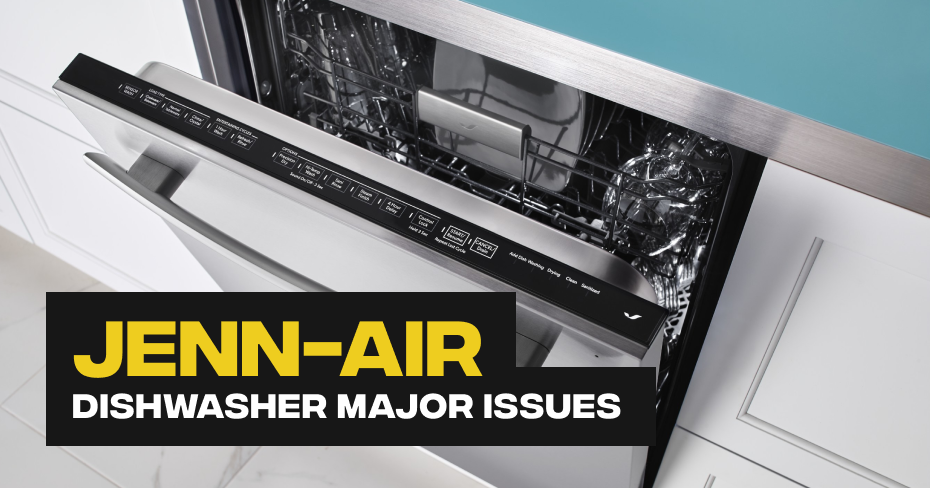
Jenn-Air Dishwasher not cleaning
A dishwasher that’s not cleaning your dishes properly not only creates a lot of extra work, it can increase your water bill too! Doing dishes, pots, pans, and silverware by hand is both inconvenient and costly.
If your dishwasher is not working properly there are several possible causes for an ineffective dishwasher, including a dirty filter, a clogged spray arm, or a broken soap dispenser. To help you get your dishwasher cleaned effectively again, the experts at Mr. Appliance have put together this guide to help you pinpoint and resolve the problem.
Troubleshooting Tips for a Dishwasher That’s Not Cleaning Well
When your dishwasher is not getting dishes clean, cleaning the machine may fix the issue. After that, regular maintenance should keep your unit running efficiently. However, dirty components are not always the root of the problem. Here are some likely reasons that your dishwasher isn’t cleaning dishes well:
Dirty Interior
Things accumulate on the inside of your dishwasher: grease, bits of food, mineral deposits from hard water, soap scum, and more. Cleaning the interior of your dishwasher is a good first step when the dishwasher isn’t cleaning dishes well. If buildup is minor, try running a vinegar cycle: Pour 3 cups of white vinegar into the bottom of the unit, and run through a full cycle.
Dirty Filter
Dishwashers made before 2010 most likely have a self-cleaning filter that operates by grinding down food particles until they are small enough to wash away. Newer, quieter models typically have a removable filter that needs to be taken out and cleaned periodically. The filter is below the bottom rack, usually secured with a twist-off cap. To clean the filter, remove it from the machine (using the owner’s manual instructions) and rinse it thoroughly under hot water. If there’s a stuck-on gunk, soak it in hot, soapy water for several minutes and gently clean it with a soft brush before rinsing.
Clogged Spray Arm
Spray arms spin around below and/or above the dishwasher racks and shoot water to wash the dishes. The jets (tiny holes) in spray arms can get clogged, which reduces water pressure and their effectiveness. Cleaning the spray arms should help improve the cleaning process. Depending on your model, the arm may come off easily for cleaning, or you might need to remove a screw to take it out. Scrub it with a soft brush and dish soap, use a toothpick or bristled stick to dislodge particles and clear clogs in the holes, and then rinse it well under hot water.
Broken Soap Dispenser
If your soap dispenser isn’t working properly, detergent may not be reaching your dishes, or it may not be released at the right time during the wash cycle. A common issue is a jammed spring in the dispenser door. Try using a small brush to clean the soap dispenser and springs. A mixture of hot water and vinegar will help dissolve grease and debris. If the spring or the dispenser door is broken, it needs to be replaced. Finally, check the gasket around the dispenser, and replace it if it’s cracked. Rubbing a small dab of petroleum jelly around the gasket occasionally can extend its life.
Low Water Temperature
Most dishwasher cycles require a water temperature of at least 120 degrees Fahrenheit to work properly. Some models have a heat-boosting mechanism built in, but if yours doesn’t, make sure that your water heater is set to 120 degrees. (Be careful! Setting the temperature any higher than 120 degrees creates a risk of scalding.) Finally, you can run the kitchen faucet for 30 to 60 seconds before starting the dishwasher to ensure that hot water enters the machine at the start.
Detergent and Related Issues
Low-quality or improper detergent can lead to spotty dishes. Using too much detergent can also cause problems. Be sure to use the right type of detergent and the appropriate amount. A final rinse agent should improve results, too. If you have hard water, consider installing a water softener to minimize mineral deposit damage. Lastly, be sure to load the dishwasher correctly.
Water Volume or Pressure Issues
Water pressure problems are likely to affect appliances like dishwashers and washing machines. If you’ve noticed that water pressure in your faucets has been lower than normal, or if the pressure seems to be fluctuating, you may need professional help to address the issue.
Failing Inlet Valve
The inlet valve allows water to flow into the dishwasher. If you’ve recently noticed a hammering sound coming from the unit as it runs, a faulty inlet valve is the likely culprit. Check your owner’s manual for dishwasher parts and replacement information.
Schedule Appointment